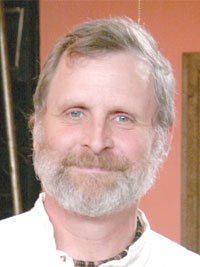UNCOMMON COMMON SENSE
By Bill Frayer
When Expert Opinion is Questionable
 I recently encountered a medical challenge which caused me, for a time, to commit a common oversimplification error, appeal to authority. Let me explain.
I recently encountered a medical challenge which caused me, for a time, to commit a common oversimplification error, appeal to authority. Let me explain.
One day, while my wife was back in the United States, I was struck by a headache, which worsened as the day went on, and accompanied by vertigo and nausea. I decided to take it easy and see if the symptoms would subside. After another day at home, the symptoms were worsening, so I saw see my doctor. He took a blood test, pronounced that I had a virus, and sent me home to rest with several medicines.
After two more days, I was having trouble keeping anything down, including the medicines. He admitted me to the Ajijic Clinic for two days to get some IV fluids, as I was becoming dehydrated. The next few days were still not good, and a friend of mine, whose physician son-in-law was visiting, came by to see me, and announced that I needed a head scan. I called my doctor, and told him this. He told me a head scan was unnecessary. I trusted him and didn’t question his diagnosis as I probably should have. Finally, one of my good friends insisted me that I needed to be checked out by another doctor, and I reluctantly agreed.
My story ends well, for as a result, I was taken to Guadalajara for an MRI, and they discovered the source of my problem: a brain hemorrhage! It was treatable, and I have recovered and have been pronounced healthy again.
Now, why didn’t I question my doctor sooner? It took ten days of misery before I finally got a head scan. I assumed my doctor knew best and willingly went along with his opinion, even though the evidence I had was contradicting his diagnosis. I was making a classic oversimplification error: appeal to authority. I was accepting his diagnosis as fact on the basis of his expertise. I knew better, but was too close to the situation to see it clearly.
Of course, we must use the advice of experts. After all, they presumably know more than we do about their areas of expertise. The problem arises when we accept an expert opinion as fact without examining it. Medical opinions are a good example. Even though physicians are experts, their opinions should not be blindly accepted as fact. Good physicians will be very open about this, and consider their opinions as tentative. After all, they are making diagnoses based on incomplete evidence.
Remember those “experts” who assured us that Iraq had WMDs? They were widely believed, based on their experience and knowledge, and they were spectacularly incorrect. Go figure? We see experts disagreeing with one another on television. We need to ask who is paying this expert. It is not surprising to find a climate expert who works for Exxon-Mobil claiming that global warming is not caused by greenhouse gasses. Similarly, we would expect an expert like Treasury Secretary Timothy Geithner to claim that President Obama’s economic stimulus measures are reasonable and will be effective.
We must listen to experts, but not without question. Asking good questions and remaining skeptical will help us to ascertain if the authority is unbiased and likely to be correct. I learned that lesson the hard way!
Next month, I’ll look at an equally common fallacy: appeal to tradition.









